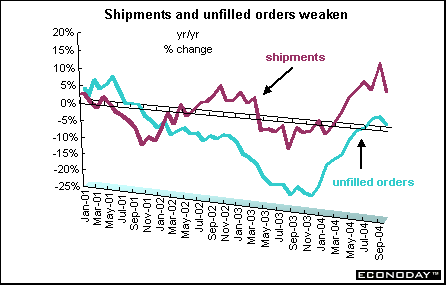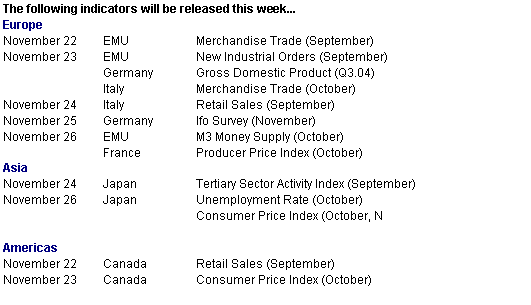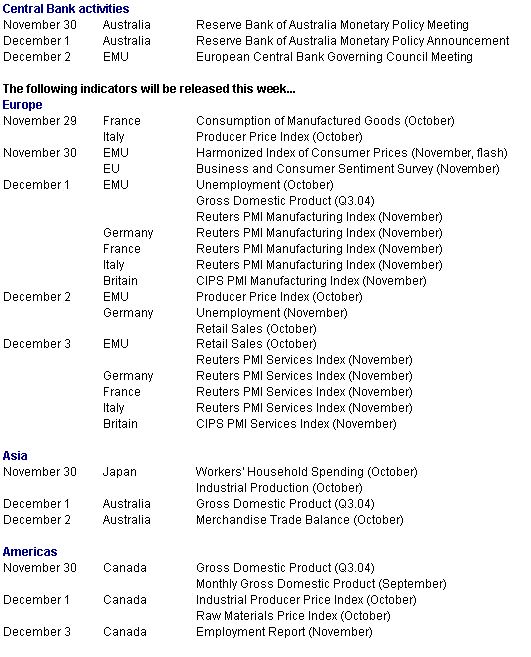Monday, November 22, 2004

International Perspective is taking Thanksgiving weekend off.
The next IP will be on December 6, 2004.
Econoday wishes you all a happy holiday weekend.
Global Markets
On Wednesday, the dollar fell to a record low against the euro and dropped against the yen when U.S. Treasury Secretary John Snow said, "The history of efforts to impose non-market valuations on currencies is at best unrewarding and checkered." Snow was responding to a question on whether he would support an agreement with Europeans to manage the pace of the dollar's decline. The downward drop of the dollar against the major currencies continued on Friday after Fed Chairman Alan Greenspan, in a panel discussion in Germany, warned that U.S. deficits are too high and that the foreign buying spree of U.S. assets may someday fizzle. Dollar/yen fell to Y102.7 per dollar. At the same time, the dollar sank to a new low (and new euro high) of $1.3075 per euro during Friday morning's volatile trading. Sentiment has been negative against the dollar for some time now and the negativity increased with the approach of two international meetings - the Asia Pacific Economic Cooperation (APEC) in Santiago, Chile and the G-20 in Berlin. Speculation has been rampant whether discussions on foreign exchange will be held and what if anything they would reveal.

Both Europe and Japan rely on exports to boost economic growth, and their rising currencies appear to be eating into exporters profits. Exporters are reluctant to raise prices and have preferred - so far - to maintain market share. European leaders including ECB President Jean Claude Trichet have been escalating their rhetoric bewailing the euro's rising value. In Japan, the Finance Minister Sadakazu Tanigaki said they are watching the yen's exchange rate closely. Japan sold a record �32.9 trillion yen in the fiscal year to March 31st but has remained on the sidelines since.

Currency focus continues to swirl around the Chinese yuan or renminbi. Pegged to the U.S. dollar, the brunt of dollar readjustment has thus far fallen on the euro and the yen. Currency markets are increasingly betting that China will free up its controversial renminbi peg in the next six months. Such a move would almost certainly usher in a wave of Asian foreign exchange revaluations against the dollar, with China's neighbors able to allow their currencies to appreciate against the U.S. dollar without losing competitiveness against the regional superpower.
And gold's up!
Usually when the dollar is falling, there is a rally in gold prices and last week was no exception. Gold hit a 16-year high Thursday at $445.90 a troy ounce. It's up more than 5 percent since the U.S. elections on Nov. 2. The new high came ahead of the expected listing on the New York Stock Exchange of a new investment gold exchange traded fund (ETF), which is backed by the World Gold Council, the industry body. It will also be the first ETF listed on the NYSE backed by a commodity - they usually track underlying stock, bond or currency indices.

Equities go in their own direction
Drug makers, under increasing regulatory scrutiny, dragged indexes down in the U.S., Europe and Japan. More and more drugs are attracting attention from regulators in Britain and the U.S. for safety reviews. Negative focus on best-selling drugs has investors backing away from this profitable sector. Investors also watched oil prices which dropped early in the week then climbed as the weekend approached. The machinations in the foreign exchange markets also attracted equity investor attention. Exporters' stocks were hurt at the prospects of declining sales and profits thanks to sharpening increases in the value of the euro and yen against the dollar. At week's end, five of the indexes followed here managed to finish on the plus side, with the rest declining.
Global Stock Market Recap

Europe and Britain
The FTSE 100 flirted with the 4800 level during the week, but in the end gave way to declining drug stocks, which were pressured by congressional hearings in Washington. The CAC and DAX retreated as well after chalking up their highest levels since the summer of 2002 on Monday. Global stock markets seem to be benefiting from electoral certainty in the U.S. and easing oil prices (despite Friday's increase). There are numerous negative influences working against the European indexes - anemic third-quarter GDP figures and the relentless rise of the euro. European shares tend to under perform when the currency is rising. Growth in the eurozone slowed in the third quarter with both Germany and France barely edging up by 0.1 percent on the quarter. Profit data, though, have provided a boost.

Asia/Pacific
Stocks were mixed last week, with the Kospi and STI (Singapore Strait Times) bumping down slightly. Despite desultory trading after Monday's big jump, the Japanese indexes managed to gain on the week. Asian stocks have flourished, recovering much of their spring losses thanks to robust economic growth and the removal of uncertainty following the U.S. presidential election. Easing energy prices have also given stocks an added fillip.

The Australian all ordinaries (along with the STI) have been the high flyers of Asian/Pacific stock indexes followed here. The all ordinaries are up 17.6 percent so far in 2004 (the STI is up 15.5 percent) as exports of commodities have boomed. The Australian economy is one of the better performers in the world economy.

Indicator scoreboard
EMU - October harmonized index of consumer prices was up 0.3 percent and 2.4 percent when compared with last year. Excluding energy and unprocessed food, the core HICP was up 2 percent on the year. Price increases for clothing, transport fuels and heating oil were partly offset by price declines for holiday costs, accommodation services and telecommunications. The ECB's inflation ceiling is targeted at 2 percent.

September seasonally and workday adjusted industrial output was up 0.5 percent and 2.9 percent when compared with last year. Excluding construction, output was up 0.6 percent and 3 percent on the year. Output among product categories was mixed: intermediate and capital goods increased, consumer nondurable goods were flat, consumer durable and energy goods fell.

Germany - October producer price index was up 0.9 percent and 3.3 percent when compared with last year. On the year, petroleum product prices soared 19.6 percent while rolled steel prices jumped by 37.7 percent. Excluding petroleum, product prices were up 0.5 percent and 2.4 percent on the year.

France - Third quarter preliminary gross domestic product was up 0.1 percent and 2 percent when compared with the same quarter last year. The slowdown in growth was due to drops in consumption and investment. Foreign trade was hit as imports outpaced exports. Only a massive inventory build-up prevented GDP from declining on the quarter.

Italy - September world merchandise trade deficit was �921 million compared with an August surplus of �1.1 billion. The deficit in September 2003 was �374 million. Exports jumped 7.4 percent while imports soared 9.7 percent on the year.

September seasonally adjusted industrial orders edged up 0.1 percent following a 0.2 percent monthly gain in August. Orders were up 5.3 percent when compared with last year. While domestic orders were up 1.1 percent, foreign orders dropped 2.2 percent.
Britain - October consumer price index was up 0.3 percent and 1.2 percent when compared with October 2003. Inflation was boosted by the biggest increase in housing costs (including water, electricity and gas bills) since comparable records began in 1997. Housing costs rose at an annual 4.4 percent rate, up from 3.8 percent the previous month. Additional upward effects on the CPI rate came from more expensive fuel and lubricants, package holiday prices and vegetable prices. However, the cost of clothing and footwear fell at an annual rate of 5.3 percent.

October claimant count unemployment was up by 900 while September's estimated was revised to an increase of 1,600 from the original drop of 200. The claimant count unemployment rate remained at 2.7 percent. However, for the three months ending in September, the International Labour Organization's unemployment measure dropped by 67,000 compared with the previous three months. The ILO unemployment rate dropped to 4.6 percent from 4.8 percent. Most analysts concentrate on the claimant count measures because the data are timelier. The ILO measure of employment for the three months to September was up by 55,000 compared with the previous three months. The employment rate was 74.7 percent, up 0.1 percentage points from the previous quarter.

Average earnings for the three months to September were up 3.7 percent when compared with the same three months a year earlier. The decline was due mainly to weaker bonus payments. Excluding bonuses, earnings were up 4.3 percent.

October retail sales were down 0.4 percent but were up 6 percent when compared with last year. Most sectors were down on the month including non-store retailing & repair, food, non-specialized and household goods stores. However, sales of textiles, clothing & footwear were up.

Americas
Canada - September factory shipments declined 0.6 percent but were up 10 percent when compared with last year. The drop was primarily due to a drop in the aerospace industry. Excluding the aerospace industry, shipments remained comparable with August's level. Hurricanes in the Gulf of Mexico and Caribbean affected orders while ongoing political strife in the oil-rich Middle East and Nigeria added to the mix of uncertainty in global oil production. Orders were also affected by the strengthening Canadian dollar against the U.S. dollar. Unfilled orders sank 1 percent after dropping 0.9 percent in August. New orders were down by 0.6 percent.

Bottom line
Despite the howls of pain from policy makers throughout the European Monetary Union, it is unlikely that the European Central Bank will accede to finance ministers' wishes to intervene to weaken the euro. The ECB has not done so for about four years and is unlikely to do so without U.S. backing. The same cannot be said of Japan where monetary officials are reluctant to leave the yen to market forces and have a long history of intervention. The finance ministry spent over �20 trillion in the first three months of 2004 even though they have not intervened since the end of their fiscal year on March 31st. Meanwhile, the markets wait for China to unpeg its currency.
Over the next two weeks, an avalanche of new economic data will be available for investors. That combined with central bank meetings at the beginning of December will provide ample fodder to help investors make decisions. IP will return on December 6th to tell you what this all adds up to.
Looking Ahead: November 22, 2004 through November 26, 2004

Looking Ahead: November 29, 2004 through December 3, 2004




